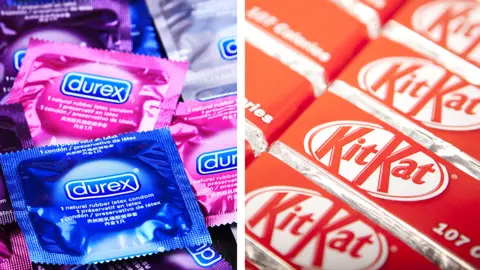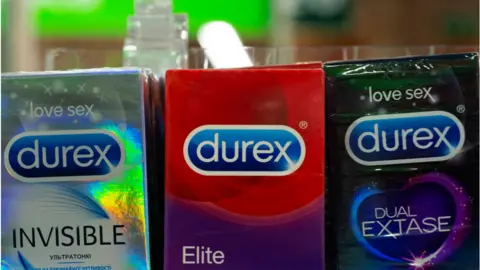KitKat and Durex makers Nestle and Reckitt warn of price rises
 Getty Images
Getty ImagesKitKat and Nescafe-maker Nestle has warned it will increase the prices of its products due to the growing cost of producing its goods.
Mark Schneider, boss of the food group, said it was "safe assumption" that prices would rise this year.
He said there was "no place" in the company that was "exempt of inflation".
Reckitt Benckiser, the consumer goods company behind Durex and Dettol, also said prices would rise, but added it hoped to absorb most of the increases.
Reckitt's costs rose 11% in 2021, but chief executive Laxman Narasimhan said that wouldn't mean prices rising by that amount, as the company had ways to "mitigate and manage pricing"
"We care about the competitiveness of our brands," he told a conference call.
Jeff Carr, chief financial officer, said the firm's costs had increased "across the board", ranging from crude oil and plastic, to shipping and wages.
But he said that company was "absorbing a significant part" of higher operating costs through "efficiency" and "better buying".
"We are not passing it on to consumers," he said. "We are passing some pricing onto consumers but we minimise that through the programmes we have…to absorb those cost increases."
Shares rose in the company by as much as 5.4% on Thursday.
Meanwhile, Nestle said it had already lifted prices by 3.1% in the fourth quarter of its financial to offset rising operating costs.
"It is a safe assumption that our input cost increases for 2022 will be higher than 2021, that is something that we have to reflect in our pricing," said Mr Schneider
"There is almost no place in the company that is exempt of inflation now," he added. "Some of these things you can hedge against, some not."
Consumer goods companies have previously warned of price rises for products due the rising costs of raw materials, energy and labour.
It will raise pressure on households who are facing a cost of living crisis.
Recent data showed that inflation hit a 30-year high of 5.5% in the year to January and the Bank of England forecasts that the cost of living could reach over 7% by spring - far above its 2% inflation target.
Gas and electricity costs are set to rise in April when the new, higher energy price cap is introduced. At the same time companies, their staff and the self-employed will pay 1.25p more in the pound for National Insurance.
Danni Hewson, financial analyst at AJ Bell, said big brand owners were facing an "important test given pressures on the cost of living".
"Consumers may not be able to keep stomaching price increases and so there is a risk they buy less of the popular and more expensive brands and/or trade down to cheaper options," she added.
"The big brand companies therefore face the risk of having to cut their prices just to maintain sales volumes."
Rising sales
Nestle, which also makes Cheerios and Smarties, revealed total sales increased by 3.3% to SwFr87.1bn (£69.5bn) last year.
The firm's net profit grew by 38.2% to SwFr16.9bn.
It said sales had been driven by strong demand for coffee, pet products and health foods during the pandemic.
 Getty Images
Getty ImagesMeanwhile, Reckitt said its full-year sales had increased by 3.5%, ahead of expectations, on demand for hygiene and health products.
Splitting its divisions, hygiene performed best with sales up 1.6% in the year to £5.9 billion, including strong sales of Air Wick, Lysol, Finish and Vanish.
Sales of Durex condoms, KY lubricants and Veet hair removal products were boosted as lockdowns were lifted.
The firm added sales of US cleaning and disinfecting spray Lysol were about 90% higher than 2019.
It said it expected its health business to benefit from stronger cold and flu treatment sales.
Last week, Unilever, the firm behind brands such as Marmite and Dove Soap, said it would put up its prices again this year as its overheads continue to rise.
The company, which also makes Ben & Jerry's ice cream and Hellmann's mayonnaise, said it was facing €3.5bn (£2.95bn) of extra costs in 2022 alone.
